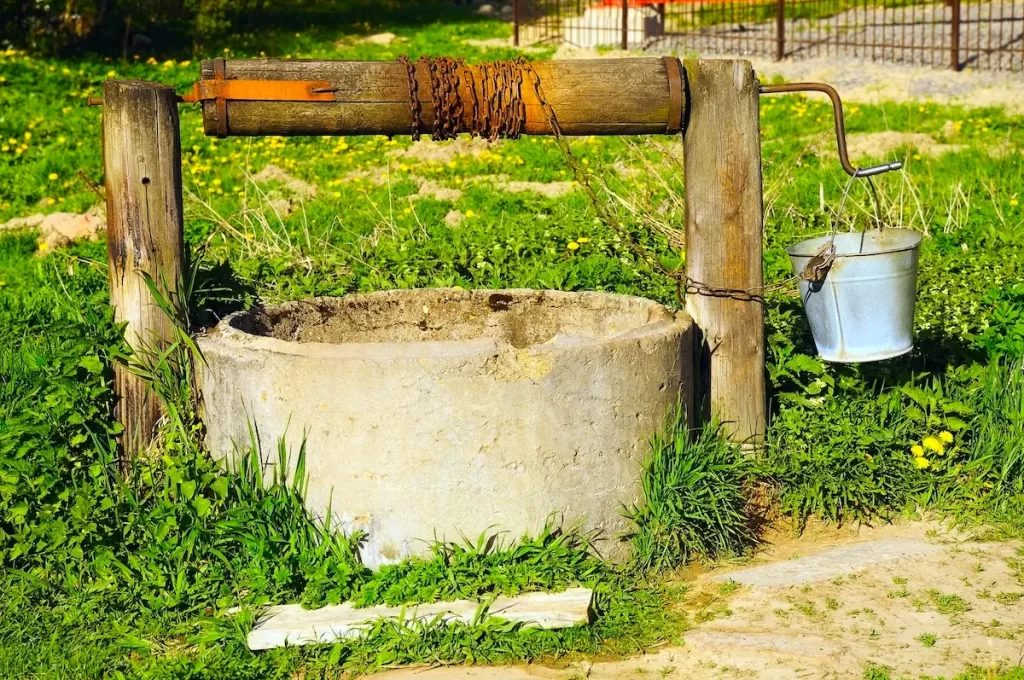Yes, a pressure washer off a well can be run on lower water pressure. Only two GPMs (Gallons Per Minute) are needed to run one.
The minimum flow of six GPMs are standard for a well to supply water to a single-family home.
This means there shouldn’t be an issue with running a pressure washer off a well.
Pressure washers are immensely useful tools for clearing dirt and grime off all kinds of decks, driveways, and tiles.
What do you need to run a pressure washer off a well? Could you run it off something with low water pressure?
To understand how run a pressure washer off a well, we’ll need to discuss relationship with a pressure washer and Gallons Per Minute.
Let’s start with the basics of how GPM and waterworks.

Related Reading: How Much Water Do Pressure Washers Use?
Table of Contents
Gallons Per Minute
Gallons Per Minute or GPM is the main measurement for using a power washer getting the right pressure. There are also many other occasions within the plumbing where the GPM is used.
For example, you might have stumbled upon 2 GPM versus 2.5 GPM shower heads when in the hardware store. Most have no idea what is meant by a GPM.
GPM is the flow rate of plumbing devices measuring how much water is coming through the pipe.
A 2 GPM shower head compared with a 2.5 GPM one will pump out 0.5 less water within the same minute. This information is crucial depending on how much water you want to handle a specific task.
The Federal Government regulated the flow rate for shower heads not to exceed 2.5 GPM. If you have a shower head made before 1992, it may have a greater GPM.
However, you also have to understand GPM is based on another measurement known as the Head.
This isn’t the shower head when shopping, confusingly enough, but is a measurement of how high water must reach to get pumped through the system.
Head Related to GPM
There are three different types of heads.
- Total Head: The highest point water must reach to pump water through the system or the discharge point.
- Total Suction Head: The height between the source of the water and the pump itself.
- Total Discharge Head: The height from the pump to the highest point that it can pump fluid to in the system.
When looking at water pumps of any kind, be it the shower head or a pressure washer, we’re looking at how much or how fast it can pump water.
We also need to know how much pressure the water will have when it comes out.
To figure this out, we need to figure out how hard the pump will have to push against gravity.
The harder the pump is able to push against gravitational force, the higher you can have the discharge point and still have liquid coming out.
The higher the Head, the lower the GPM.
This means the higher the end of the shower, the harder the pump will have to pump to get water out.
The amount of water coming out will slow down.
I’m sure many of you have experienced this when lifting and lowering your own showerhead. Usually, the measurements of this kind will look like this:
- 140 GPM 40 feet of Head
- 100 GPM 60 feet of Head
- 60 GPM 70 feet of Head
Now we know the basics of how a pump works and is calculated, it’s time to take a look at pressure washers.
Pressure Washer Off a Well and Gallons Per Minute
We’ve now discussed GPM and Head and how that affects pumps and the flow of water.
Now we can discuss pressure washers with a bit more understanding.
Because pressure washers spit water out at such high amounts, people often think that you need a source with good water pressure.
Some people have worried that doing so with poor or non-existent water pressure will break the pressure washer.
Luckily, that’s not true at all. The truth is that a pressure washer creates its own water pressure within the device itself. This offers all the GPM you really need for just enough water to get into the pump.
The pressure washer can take it from there, which makes sense.
If a pressure washer needed the water source to have the power of a pressure washer in order to run, then all outside spigots or hoses would be blasting water out like fire hoses.
Why would you need the pressure washer at all in that case? (And could you imagine watering the garden with a hose with that water pressure?)
Now, this isn’t to say that the pressure washer shouldn’t be checked.
Most pressure washers will say on the box, but some may need 3 GPM.
If you have 2.5 GPM taps, then it might not be good for the pressure washer to plug it in.
However, most pressure washers run at 2 GPM, and most water taps run at 2.5 GPM. So, you should be able to run a pressure washer off a well. Just something to be aware of.
Wells And GPM
Finally, this leads us back to wells.
With their very still waters, people may worry that they won’t be able to run a pressure washer off a well, but that is not the case.
On average, a residential well supplies a residential home with between 100 and 120 gallons of water daily. This works out to a flow rate of between 6 and 12 GPMs.
That should be plenty to run a pressure washer off a well.
There is one exception to this that you might need to be aware of. There is one common circumstance where the well might not have the GPM.
If your well’s water feeds into your home without the use of a pump.
The pump only begins to work when the well is running on empty. In that instance, your well might not be producing the required amount of GPM for a pressure washer.
These circumstances are rarer, however, and most wells should be able to run pressure washers without an issue.
Related Reading: Do I Need to Wear a Mask When Pressure Washing?
Conclusion
Despite worries of people that still water such as wells won’t be able to run pressure washers, the fact is it almost certainly can.
This is because the GPM (Gallons Per Minute) required by pressure washers is only around 2 GPM when most wells commonly provide about 6 GPM.
Pressure washers provide most of the pressure within the device itself and only need enough GPM for the water to reach its internal pump.
The only exception to this good rule is if the well supplying your home with water does not use a pump to do so. You may not have the GPM required, but this is quite rare.
If you have a well, get out there and clean your property with a pressure washer.
Enjoy living the outdoor life!!!
